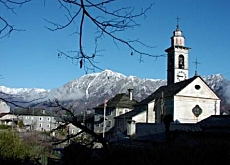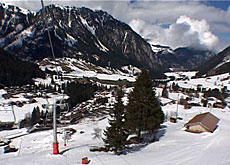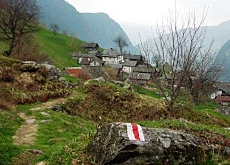Hundred Valley village reinvents itself

Rasa is an enigma; a village in the southern Swiss Alps where time has stood still, but nothing is as it seems.
The trip to Rasa begins in the region with the most enchanting of names; the Centovalli, the valley of the “hundred valleys”.
We disembark from the train at the unmanned station in Verdasio for the last stage of the journey – a seven-minute high-wire act aboard a tiny gondola; its supporting cable the only thing connecting Rasa to the outside world.
I can’t help but think of it as the perfect metaphor for a village whose survival for many years hung by a thread.
Shortly after we arrive, we are greeted by the manager of the camp where we will spend the next couple of nights.
“They call me ‘Lupo’,” he says, “because that is the Italian word for wolf and my name is Wolfgang.” Wolfgang, in this case, is a shepherd in wolf’s clothing, in charge of the flock at the Christian retreat, Campo Rasa.
Song and prayer
The Protestants moved in when Rasa’s Catholic, Italian-speaking population, save for one family, was moving out. That was in the 1960s and early 70s, and property could be had for a song and a prayer.
Knowing we are on assignment, Lupo is quick to send us out to take pictures and record video footage of the picturesque village before nightfall.
We take our shots as the setting sun falls on the proud tower of the Catholic church that dominates the cluster of stone houses spread along the ridge in a village that has been “saved” by evangelical Protestants.
In the 1960s, the Swiss-German-run Christian movement, the United Bible Groups (UBG), was looking to set up a retreat far from the madding crowds. Forty years on, the retreat – Campo Rasa – has become, for all intents and purposes, a village.
It has restored many of the houses, operates the village farm, manages the forest, produces its own solar and wood-powered energy and accounts for most of the village income through bible seminars, religious counselling and letting out rooms and flats to tourists.
“Rasa would no longer exist if it wasn’t for the UBG,” Lupo says when we finally get a chance to speak, choosing his words carefully so as not to offend the remaining Catholics.
Hippies
But we discover that Rasa could have reinvented itself in any number of ways. At the height of the student revolts and hippy movement of the 1960s, there was a modest flight of idealistic Swiss-Germans to Italian-speaking Ticino where they set up communes in abandoned alpine villages.
One man turned the village neighbouring Rasa into a rehabilitation centre for drug addicts. Over the past 30 years, the addicts have helped rebuild the place as part of their therapy.
Renato Domiczek is Rasa’s ageing hippy. Sitting in front of roaring fire on a cold spring evening, Domiczek is reflective, admitting that he was one of these romantics who “wanted nothing else in life but to milk goats and smoke pot”.
He was hired in 1974 to be the Christian camp’s full-time manager, became the first to resume farming on the steep village slopes before turning his hand to art, learning the craft of pottery and specialising in Japanese-style Raku ceramics.
Longing
“When I came here for the first time in 1967, I was fascinated by the place’s simplicity and authenticity,” he explains. “It awoke a longing in me, and I knew I had to come here to live.
“The natural environment is my home, not just my four walls. The landscape around Rasa is intact and full of contrasts, with few traces of the modern world. And that has influenced my art, which I believe is very rooted in the soil. Living close to the earth is of central importance.”
As the hours tick away, the fire is still roaring but the wine bottle has been emptied. Lupo appears with his wife, and glasses are refilled, this time with other spirits.
“The only sound you hear at night is the sound of the two streams flowing past the village,” the wolf says. “Maybe that’s why people come here. There are no roads and therefore no cars or other unnatural noises. This goes deep inside you, and has a calming effect.”
“For me, leading a holistic way of life is what counts,” the potter adds. “And that is what I try to put into practice. It’s not only a theory – and certainly has nothing to do with theology.”
swissinfo, Dale Bechtel in Rasa
Rasa is located at 900 metres above sea level in canton Ticino’s Centovalli region.
In 1956, plans to build a road to Rasa are abandoned in favour of a cable car.
The village is still only accessible by cable car, or on foot.
For centuries, it was difficult making ends meet in Ticino’s mountain valleys by working the land alone, so men from were forced to migrate in search of jobs.
Those of Rasa were granted a monopoly as dock porters in the Italian seaside town of Livorno.
Earning enough money to bring home, they were instrumental in the decision to start a new village on higher ground, where they constructed large houses with palatial-like interiors influenced by what they had seen in Italy.
By the early 19th century, the old village, by this time known as “Terra Vecchia” (old grounds), had been completely deserted. The new village boasted 83 inhabitants in 1863.
A migration to the cities took its toll on Rasa in the 20th century. There were only about half a dozen people left by the early 1970s.

In compliance with the JTI standards
More: SWI swissinfo.ch certified by the Journalism Trust Initiative




You can find an overview of ongoing debates with our journalists here. Please join us!
If you want to start a conversation about a topic raised in this article or want to report factual errors, email us at english@swissinfo.ch.